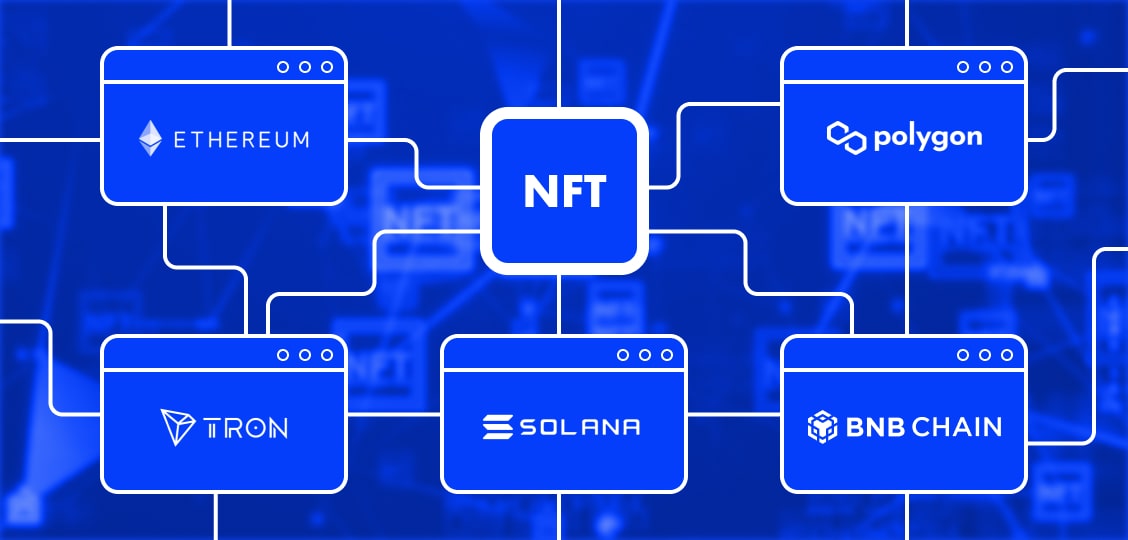How do you build a peer-to-peer marketplace platform and how much does it cost?
Find out how to build a peer-to-peer marketplace, from prioritizing features and choosing a technology stack to estimating a budget for project implementation.

With the growing popularity of non-fungible tokens, the demand for blockchain-based NFT marketplaces is witnessing a surge. Employing the blockchain decentralized ledger, it is possible to tokenize a wide range of assets, from art, songs, and in-game items to certificates and licenses.
Thanks to blockchain, content authors can ensure the uniqueness of their works and prove ownership rights. On top of that, the technology implements cryptographic algorithms to achieve security while removing intermediaries from the trading process.
However, as blockchains differ by transaction speed, the amount of fees, and functionality, the success of your custom NFT marketplace will depend on the platform you choose. For instance, if the transaction commission is too high, it may be challenging to retain users and earn income or at least not go into the red.
In this article, our software experts will describe the most popular blockchains for making an online NFT marketplace. Have a look.
Initially launched in 2015, Ethereum is a blockchain development platform containing smart contract functionality and having a digital currency named ether (ETH). Followed by Bitcoin, Ether ranks second in market capitalization. With crypto tokens, users pay transaction fees and computing energy on the Ethereum network.
At the moment, Ethereum is among the leading blockchain solutions that allow for making NFTs and decentralized applications (dApps). For this purpose, Ethereum provides all the required tools, including the Solidity language for writing smart contracts and Ethereum Virtual Machine (EVM) to execute them.
With Solidity, engineers develop smart contracts, which are self-executive digital agreements with terms “embedded” into the lines of code. The EVM, in turn, converts them into a language that can be read by computers. On Ethereum, transaction records are stored in blocks and entirely public, ensuring the visibility of transaction data.
Miners utilize computing power to validate blocks prior to uploading them to Ethereum. To verify transactions, now Ethereum employs a proof-of-work (PoW) consensus mechanism while planning to migrate to proof-of-stake (PoS)—as part of Ethereum 2.0 upgrades—to enhance scalability and performance. When initiating transactions, users are charged a fee, known as “gas”, which is paid to miners in ETH for their efforts.
However, as transaction commission is based on network activity, it can run too high. In some cases, it can reach even hundreds of dollars, for example, during the launch of new NFT collectibles. In this context, miners are likely to process transactions with the highest gas fees, forcing senders to increase the commission they are ready to pay.
As a consequence, building an NFT marketplace app may be not profitable. Since network congestion is a significant issue, it is going to be resolved in Ethereum 2.0. Currently, it is under development. Despite this problem, many businesses choose this blockchain to deploy online NFT marketplaces.
The primary reasons are Ethereum’s large user base and rich ecosystem that comprises various tools, technologies, electronic wallets, etc. With the release of the Ethereum 2.0 version, which is expected to come soon, the platform is poised to become a more appealing option to create custom NFT marketplace apps.
Polygon is a blockchain protocol that lets software developers create and connect applications that are compatible with Ethereum. Introduced in 2017 under the name of Matic Network, the protocol was renamed Polygon in 2021. This blockchain platform involves MATIC, a native cryptocurrency that powers the network and is used to pay transaction fees.
Known as a Layer-2 solution, Polygon was invented to scale the Ethereum network and increase its performance. Polygon makes transactions faster and cheaper with Layer 2 sidechains, which are blockchains running alongside the Ethereum main chain. In fact, commission often accounts for nearly $0.01.
Using a dual-consensus architecture (Plasma + PoS), Polygon optimizes the speed of transactions and decentralization.
On top of that, Polygon utilizes a modified PoS mechanism and Commit Chain connectivity to address the inefficiencies of blockchain technology such as low scalability. Additionally, Polygon’s Matic PoS Chain enables software experts to add a security layer to dApps.
So, Polygon not only preserves all the advantages of Ethereum but allows for saving costs and streamlining transitions. This way, Polygon is a great choice to build NFT marketplace software. It is worth noting that by now, more than 19,000 dApps have used Polygon to achieve performance and resolve blockchain issues. OpenSea, Refinable, NFTrade, Treasureland, and ZestyMarket are examples of famous NFT marketplaces powered by Polygon.
In our NFT marketplace development company, we have recently delivered a Polygon-based project similar to OpenSea. Thanks to this, the customer has managed to minimize gas fees and mitigate limitations associated with insufficient blockchain scalability. To learn more about this NFT marketplace platform, check out its case study in our portfolio.
If you are looking to launch an NFT marketplace like OpenSea, we recommend that you read our guide, which includes time and cost estimates.
Founded in 2017, Tron is an open-source blockchain development platform having its own cryptocurrency, called Tronix (TRX). Network members use TRX to directly pay content authors to access their digital products. As of today, Tron is mainly used for creating and hosting entertainment and media software solutions.
The system contains smart contract functionality and implements a proof-of-stake consensus mechanism. Supervised by TRON Foundation, the Tron protocol distributes computing power equally among token holders. Tron provides a decentralized virtual machine that employs a global network of public nodes to execute programs.
It is worth noting that the network structure of Tron is often compared with that used by Ethereum and has even been criticized for borrowing more than coming up with the new. However, Tron aims to address the issues of many other blockchains by achieving high throughput, scalability, performance, and high availability.
For instance, Tron has a project named DAppChain that allows DApps to consume less energy while improving transaction speed and security. Tron also charges zero fees for the majority of peer-to-peer transactions.
While Bitcoin can authorize up to 6 transactions per second, Ethereum — around 25, Tron can process hundreds of digital transactions per second. Although Tron was released not so long ago, its features make it a good choice for building an NFT marketplace app. APENFT Marketplace is an example of a successful startup developed on Tron.
Established in 2020, Solana is a public blockchain development platform that executes smart contracts and has its own digital currency called SOL. Although Solana is a relatively new blockchain, its ecosystem encompasses thousands of projects, including DeFi apps, NFT marketplaces, and Web3 solutions.
Designed for speed, Solana claims to be the fastest blockchain globally. Currently, it can process over 1,900 transactions per second with an average gas fee of $0,00025 per transaction. As Solana runs in a single global state, it provides better scalability and performance.
Not relying on sharding, the protocol utilizes a proof-of-stake mechanism. By using PoS, Solana maximizes energy efficiency. In PoS, the consensus is achieved through votes that are weighted based on the amount of SOL tokens “staked” with block validators. Therefore, network security does not depend on energy consumption.
As a comparison, Ethereum employs a PoW method, which obliges miners to use their computing resources to verify transactions. Furthermore, Solana uses a proof-of-history (PoH) mechanism that incorporates timestamps into the decentralized digital ledger, this way significantly improving the time required to process a transaction.
Introduced in 2020, BNB Chain, formerly Binance Smart Chain (BSC), is a blockchain development platform that emerged as an alternative to Ethereum but with lower fees. At the beginning of 2022, the BSC was renamed to BNB Chain, which now comprises BNB Beacon Chain (previously called Binance Chain), BNB Chain Governance, and BSC that has remained compatible with Ethereum Virtual Machine.
The key objectives of the BNB Chain are to create the infrastructure for Web 3.0 and provide new opportunities for making MetaFi solutions.
BNB Chain employs a system of 21 validators that come to a consensus through the proof-of-staked-authority (PoSA) mechanism, which allows for reducing block validation times and transaction commission. At the moment, each trade requires on average a 0.1% fee while the block times take 5 seconds or less. In addition, BNB Chain supports PoS governance for blockchain networks.
Representing a layer 2 solution, BNB Chain is a standalone blockchain that has lots of crucial business and technical functions self-contained. Thanks to this, BNB Chain is capable of enabling high availability even if the network temporarily fails.
Bringing increased performance and scalability, BNB Chain is a popular choice for building NFT marketplace software. Digital NFT marketplace platforms based on BNB Chain involve NFTb, Pentas, Element, Biswap, AirNFTs, and Venly. In April 2022, StepN, a Solana-based game with an in-app NFT marketplace, also added BNB Chain as a second network.
To choose a blockchain development platform, it is crucial to determine end-user expectations and project requirements. You should take into account a variety of aspects that involve the amount of fees, transaction speed, NFT minting cost, blockchain security level, developer tooling, and smart contract functionality.
Additionally, it is advisable to analyze competitive products to see what blockchains they use, whether imposed commissions are applicable to users or not, and what performance they provide.
If you want to build an NFT marketplace app, you are welcome to contact us. Our software experts will get back to you within 1 business day and help resolve all challenges. Project consultation is free of charge.

Find out how to build a peer-to-peer marketplace, from prioritizing features and choosing a technology stack to estimating a budget for project implementation.

A faster time to market is vital to taking leading positions and maximizing return on investment. Find out how to improve time to market while building a top-notch product.
Now, you will receive a fresh newsletter from us.
Get the latest scoop on software application tips, announcements, and updates from us. Subscribe to our newsletter!